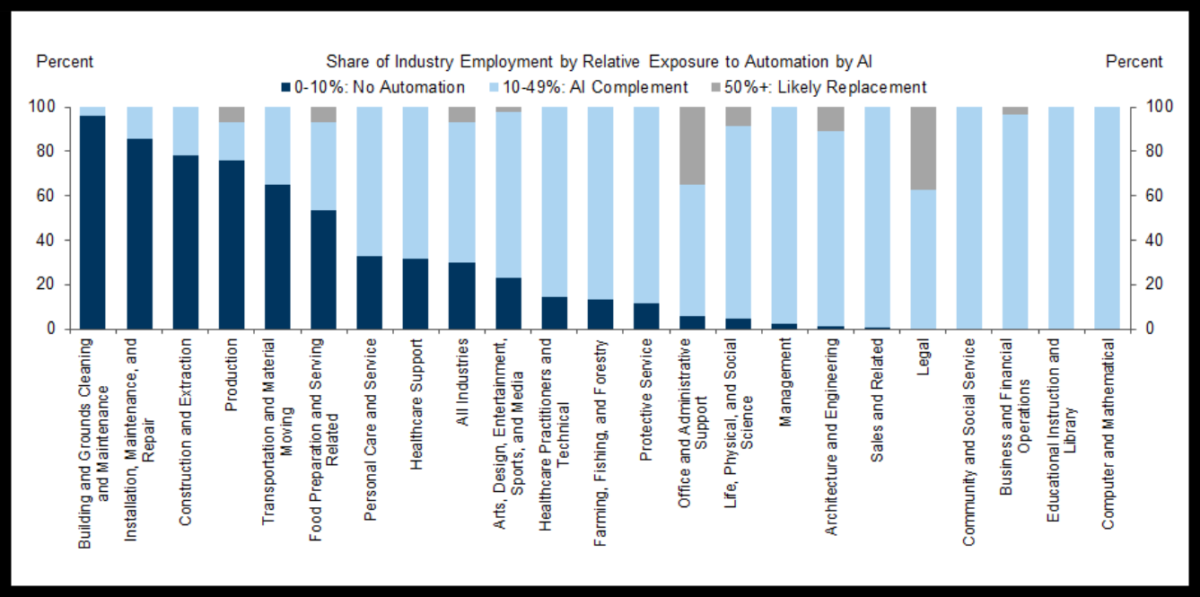By Christian Welker ('24)
“I am interviewing you, ChatGPT … about the effects of Artificial Intelligence on education and the future job market.”
“Certainly!” ChatGPT responded, “I’m happy to discuss the effects of Artificial Intelligence (AI) on education and the future job market. Reporter: How do you see AI impacting education? ChatGPT: AI has the potential to…”
Watching ChatGPT write and conduct an interview with itself left me with mixed emotions. On the one hand, it was ridiculous for the AI to believe that was what I wanted, but at the same time, it developed a line of questions in seconds that was scarily close to what I had just spent ten minutes thinking of before beginning the interview.
Interviewing an AI seems like something out of a science fiction movie, but with the Challenger Economics May 2023 report stating over 3,900 jobs were cut due to Artificial Intelligence in one month alone and Goldman Sachs estimating 300 million potential job cuts by 2030, it’s obvious many industries are taking this new tech and running with it. This trend of increasing use of AI threatens not only the current members of the workforce but also college students looking to join it after graduation. As college students are looking at a shifting job market, the question turns to how higher education should respond to the AI boom?
One area where AI affects the job market is journalism and media. Jonan Pilet, a writer for foodsafetynews.com, has been watching how Artificial Intelligence continues to change the journalism scene.
“The issue, I think, is that AI is … impacting the number of jobs because it’s taking a lot of what I would say is like the grunt work, the lower work,” Pilet said, “these are the kinds of stuff that AI can do really well because it’s like filling in a form.”
The journalism market has struggled with profitability over the past few years, with dozens of outlets laying off large percentages of their staff in attempts to reduce expenses and streamline their businesses. With the rise of Artificial Intelligence, these outlets are given the opportunity to further reduce expenses and make production more efficient by replacing workers with AI and further streamlining processes with the integration of AI tools.
“What might have taken three of us several hours to do, now one person could do in 30 minutes,” Pilet stated.
Rachel Wright, who works for Houghton University’s Office of Vocation and Calling, added, “There’s certainly going to be some things that can be done in a more automated way … that’s where I think it’s important to, for somebody who’s applying for jobs … to be able to very clearly articulate the value that they bring [to a job].”
In a shifting job market, staying up to date with the latest technology is essential. Artificial Intelligence is developing rapidly, with little sign of slowing down. How focused should colleges and universities be on integrating AI into the classroom?
Houghton Professor David Huth believes that higher education needs to do more to prepare students.
“I wish that every college and university professor could take … say, three semesters off and enroll at their institution in the world of AI so that they can actually understand what is actually happening.” Huth stated that “If I wanted to get educated in the age of AI, now, what would I be doing?”
Similarly, Pilet states that students need to learn how to use AI tools to become more efficient in the classroom and in future jobs.
“Transcribing used to take hours,” Pilet stated. “But [now] there’s transcribing tools that will save you a ton of time because it’ll do it in minutes.”
Pilet believes that in the future, the deciding factor between employees will be those who know how to use the tools to make their work faster and more efficient versus those who don’t.
“You have to use it because you have to keep up. It almost has become a nonnegotiable,” Pilet stated.
In Pilet’s opinion, it’s important for college classes to teach students how to use Artificial Intelligence and how people in their desired fields utilize AI tools. Otherwise, students risk falling behind and losing job opportunities to younger workers with more experience with the tools. However, it’s also essential that students learn the basics before they learn the tools.
“We have to avoid having the tool get in the way of learning the basics,” Pilet emphasized. “That’s the fear … if you’ve never written anything, how do you know that the AI is spitting it out well?”
Pilet ultimately stated that higher education should integrate AI into classrooms and teach students how to use the tools alongside their knowledge of the craft.
On the other hand, Huth believes that Artificial Intelligence will change the world as the internet did with its introduction. He sees learning how to use the tools as a temporary solution. In his view, colleges need to prepare for what might come next because if they are not prepared, AI could replace higher education in its entirety.
AI is rapidly advancing, and there are few signs of slowing down. As mentioned above, it is already affecting the job market and causing mass layoffs. Huth and Pilet believe that college students must be prepared to integrate AI into their workflow to remain competitive in an increasingly AI-focused world.
For what it’s worth, ChatGPT seems to agree. When asked how people should consider AI in the job market, the AI stated: “The dynamic nature of technology and the job market underscores the importance of lifelong learning. College graduates should be prepared to adapt and upskill throughout their careers to stay relevant in a changing landscape.”
As Artificial Intelligence continues to evolve and change the world around it, students entering the workforce need to be at least aware of the tools their potential jobs are using and how to utilize them to stay competitive. ★

